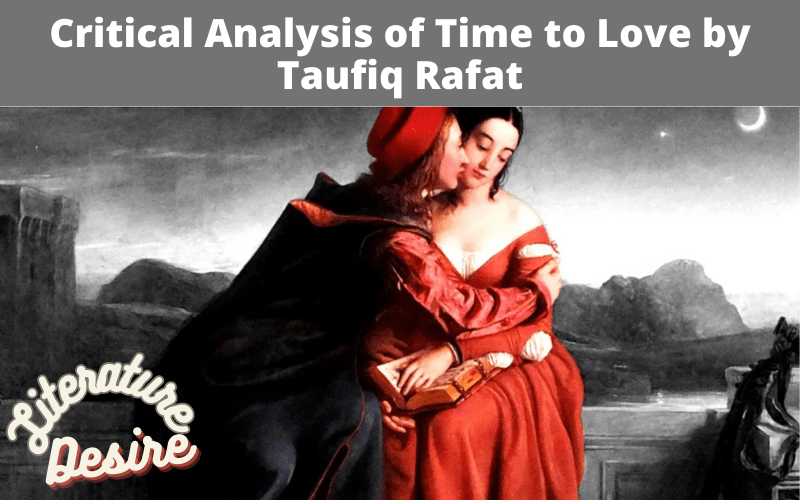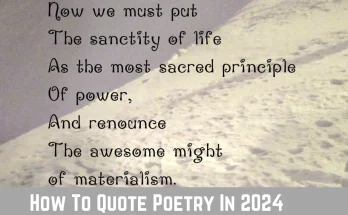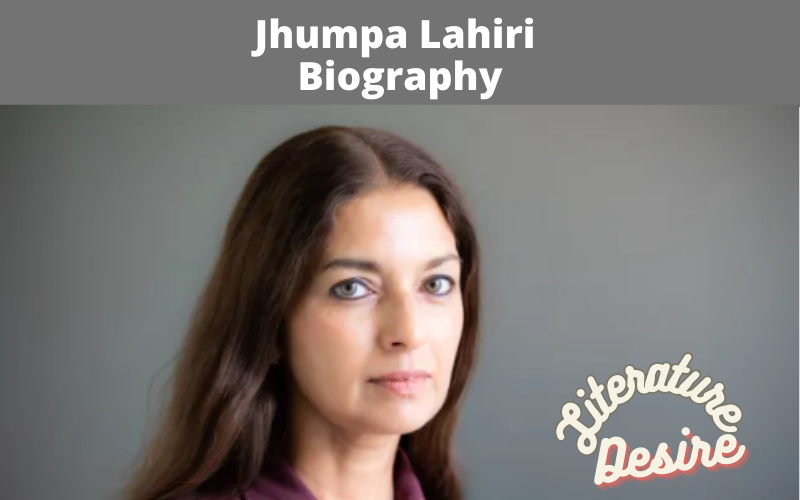Let’s dive into the Critical Analysis of Time to Love by Taufiq Rafat. Time to Love is a popular love theme. However, this poem is different from ordinary and conventional love and shows the truth of the romanticism of English poets and makes his poetry more valuable by giving meaning to poetic ideas and impressions of great Urdu ghazals. Taufiq Rafat is an Asian-Romantic poet, well-known for the Pakistani -idiom.
This poem expresses the philosophical aspects of intellectualism and love as opposed to the formal and subjective nature of the poem.
English romantic poets such as Chaucer, Wordsworth, Shelley, Keatler, Byron, and Coleridge are Asian romantic poets who focus more on love and nature in their poetry.
As a romance, it also captures the charm of different seasons and Rafat revels in the love of this poem by referring to the seasons. The reference to love and seasons shows his love for nature and the universal true love of two hearts.
Critical Analysis of Time to Love by Taufiq Rafat
Time to Love is a poem about love. It is true that love does not wait for time or season. There is no logical or rational reason behind why one person falls in love with another. It cannot be controlled and created by human will because love is truly pure and intuitive.
Likewise, it is free from any practical understanding or meaningful worldly obligations. Therefore, it is independent of time and season. There are times of love, there are countries that are ruled by the greatness of the heart.
Rafat tries to show the power of love and is very beautiful which overwhelms the mind and heart. Love is a reality that does not accept the greatest reality, but transforms them completely with invisible supernatural courage.
Because he works with the heart and not with the mind, he is not only a powerful person, but all the material power of the greatest power in the world disappears before him.
He uses various metaphors to explain that love is not afraid of weather conditions, time constraints, and other practical factors. It has a world, different countries, and a faithful climate.
Critical analysis and interpretation
In the first line, the poet explains that love has no time. The universe has nothing to do with time and space. Love can happen anywhere and anytime. It doesn’t matter the age or the age of the lover. In the same way, there is no need for a specific time, but it happens every time.
He is also capable of being a time-warper. It remembers the past or jumps to the future. He waited for a while, not months or years. It is said that love is perfect and the intellect of love can put its love in anyone’s heart without facing any obstacles for weather and time factors.
Time is forever for lovers (William Shakespeare)
In the second stanza, the poet continues the tradition through the season and season of love. Time to Love illuminates several seasons, including Fall, Winter, and Spring.
It’s not even seasonal because time is wasted before love. Regardless of time, season, and place, he flies freely across the world and touches anyone’s heart wherever and whenever he wants.
In general, some poets say that spring is the season of love, but it is said that love does not require any special criteria, instead, it rejoices without fear of its spiritual and emotional power anywhere, maybe in every branch of the tree. air pressure.
“Whatever is born in the spring dies in the fall, but love is not seasonal.” (Rumi)
The third and last line, consisting of only two lines, summarizes the poet’s belief in self-love as complete as air and country.
A limited time cannot be limited by a particular season and a particular region, but it does not need close favorites like religion, caste, or national and ethnic boundaries. Whenever and wherever he suddenly entered someone’s heart.
Love knows no gender, age, sex, country, weather, No symbol of love.
In short, according to Taufiq Rafat, love is one of the most powerful things in the world. It is universal and unaffected by time, season, or other materialistic and physical forms.
“Lovers don’t finally meet somewhere. They’re with each other all along. (Mawlana Jalal-al-Din Rumi)”



